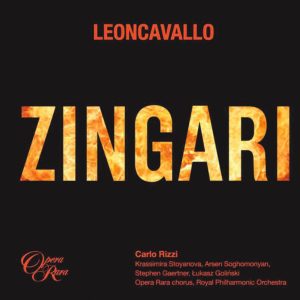
CD Review: Opera Rara’s ‘Zingari’
By Bob DieschburgAfter last year’s release of Donizetti’s “Il Paria” it is now the turn of Leoncavallo’s “Zingari” to be featured in a flawlessly produced recording by Opera Rara and its artistic director, Carlo Rizzi, at the helm of the Royal Philharmonic Orchestra.
“Zingari” is the British label’s second dive into the veristic treasure-trove of Leoncavallo’s musical oeuvre and, as such, a condensation of fin-de-siècle tropes. Not only does it show much exoticism “alla zingaresca” (as marked in the score) but also a startling mix of scenic violence and effects, including a blood ritual and double murder in true “Pagliacci” fashion.
Verismo in a Nutshell
“Zingari” is not a total stranger to the recording industry, as Bongiovanni, for instance, have released their take on the tale as recently as 2021.
In the present edition, however, “Zingari” stands before us for the first time without its customary cuts and, where necessary, re-orchestrated by the minute hand of Martin Fitzpatrick from the English National Opera. It delivers a most faithful reconstruction of what London audiences would have heard at the Hippodrome Theatre in 1912 – when Leoncavallo conducted its premiere.
As it is, the opera is divided into two episodes with an orchestral interlude in-between, reflecting the idiom, both musically and in terms of the narrative, of the ancestral verismo works in Italy. More specifically, I find it to emulate the ideas of Puccini’s “Le Willis” (as “Le Villi” was known in its one-act form) which, conveniently, was recorded by Opera Rara in 2019.
The most striking of similarities run thus: the structural makeup of both “Le Willis” and “Zingari” as a so-called number opera; the vocal writing which lends itself to a high tessitura, particularly for the baritone roles of Guglielmo Wulff and the Tamar; and the dramatic function of the intermezzo bridging the libretto’s unaccountable lacunae in leaving out major psychological developments (Anna dying of heartbreak and Fleana requiting the advances of Tamar).
To put this into context, Leoncavallo in 1912 harks back to the innovations of Puccini and Mascagni, as well as to his own success with “Pagliacci” in the early 1890s, adopting an eclectic and essentially anachronistic style for the music hall aesthetics of his “Zingari.”
Fire & Passion
Loosely based on a dramatic poem by Alexander Pushkin, “Zingari” tells the story of the Roma woman Fleana (soprano) and her triangular relationship with Prince Radu (tenor) and the gypsie poet Tamar (baritone). The latter is the jealous lover who, rejected at first, wins over the fickle Fleana in circumstances barely hinted at, left, so to speak, at the discretion of the intermezzo with its introduction of a new love theme.
Their nascent affair, however, finds a cruel ending as a maddened Radu, who for Fleana has abandoned his social standing as a Prince, locks the couple into a hut and maliciously sets it on fire.
The cast is led by Krassimira Stoyanova whose unerring sense for dramatic nuance and incisiveness set the standard for the score’s continuous flux of high-strung emotions, ranging from the melismatic teasing of Fleana’s dance (“La la la la!”) to the exclamatory fortes of the duet “Tutta la mia vita ti donerò” (to the C flat of Arsen Soghomonyan).
Vocally the steely edge of her timbre serves the Bulgarian soprano well, not just in accordance with the string accompaniment or the onomatopoeic echoes of the clarinet in Fleana’s already mentioned dance, but as a marker, if you will, of her moral ambiguity and fickleness (much like Carmen or Tigrana from Puccini’s “Edgar”).
In the Armenian tenor Arsen Soghomonyan she finds a congenial partner whose heft and vocal stamina does not preclude him from striking a more lyrical tone, as when starting on the arioso romance of “Occhi azzurri” which then fades out in a beautifully sustained diminuendo.
My only criticism, irrespective of his individual and, I should say, imposing performance, regards the matching with the equally magisterial Stephen Gaertner. As Soghomonyan’s timbre is heavily baritonal, the differentiation between the characters of Radu and Tamar gets somewhat blurred, which, in the case of “Zingari” with its reduced cast of soloists and relatively short duration, leaves a sense of bemusement.
With that being said, Gaertner commands a rock-solid technique which, in true bel canto style, allows him to gloriously spin the line in Tamar’s “Canto Notturno” and reach notes above the staff with no seeming effort.
The three protagonists are excellently supported by Lukasz Goliński in the role of the Old Man whose solemnity he condenses into the rich, velvety sound of his bass-baritone. The chorus under the direction of Eamonn Dougan is enthralling, from our very first introduction to the Roma camp (including an unveiled reference to Verdi’s anvil chorus) to the frantic ending amidst the flames of the burning hut.
“Zingari” Rediscovered
After several listens I have overcome my initial reticence as to “Zingari’s” ability to elicit any further interest other than the die-hard aficionados’ taste in the ever so scarce. The score is intensely eclectic and, for better or for worse, markedly anachronistic. By 1912, its formulaic structure as a number opera may not have stood at the avant-garde anymore – its dramatic appeal, however, remains untarnished.
Opera Rara has made a strong case for Leoncavallo’s “Zingari” which excels thanks to the inspired performances of its soloists and the fast-paced but no less minute conducting of Carlo Rizzi.
It is, to my knowledge, the best recording currently available and, as such, represents another milestone towards a better understanding (and, possibly, reevaluation) of its composer. Whether it is enough to restore “Zingari” within the international repertoire only time will tell.


